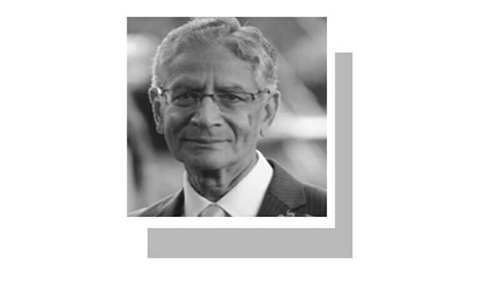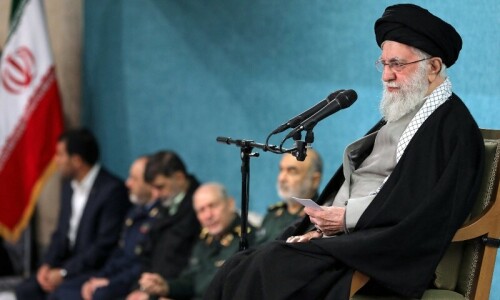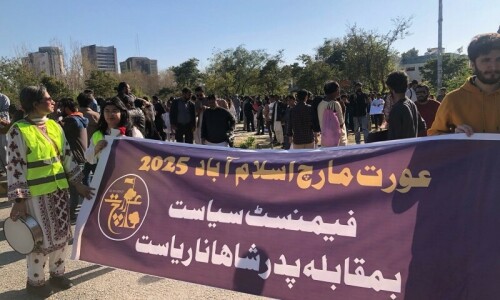THE prime purpose of legislating labour laws was to enable industrial and commercial establishments to manage their manpower in accordance with procedures and guidelines for the disbursement of benefits to workers. Barring the Employees’ Old-Age Benefits Act, 1976, the promulgation of other labour statutes was mostly to benefit non-management and unionised employees. They cover all aspects of employment, from recruitment to retirement, with provisions for terminal benefits and old-age pension.
There are some 190 labour enactments and the rules made thereunder. The most prominent among them are: the Factories Act, 1934, which has provisions for the health and safety of workers engaged in the manufacturing process, their leave entitlement and the condition of a hygienic work environment. The Shops and Establishments Act, 1969, lays down similar requirements for office staff. The Industrial and Commercial Employment (Standing Orders) Ordinance, 1968, provides terms of employment of workmen to be implemented by employers, and the ordinance also states that the services of a workman cannot be terminated on the grounds of misconduct without giving him the opportunity to defend himself in a domestic inquiry.
The Industrial Relations (IR) Ordinance, 1969, has procedures for the formation of unions, referendum for collective bargaining agent union, fora that maintain cordial working relations between the management and CBA, redressal of workers’ grievances and judicial forums for them to challenge employer action. The three different acts related to wages provide for timely payment of salaries and claiming unpaid wages. Unauthorised deductions are prohibited and minimum wage for all categories of workers allocated. Besides these, there are laws for the provision of medical benefits, maternity leave, workers’ share in company profit, apprenticeship schemes to train in various skills and educational assistance for workers’ children.
Therefore, given the vast scope of the decrees, it is imperative that managers overseeing industrial relations are thoroughly conversant with labour regulations as implementation is their key responsibility and any violation will prove embarrassing for the enterprise and its management. Obliviousness in this area hampers the execution of assigned tasks and the supervision of daily work, besides making for ill-informed communication with government officials and inept responses to notices from stakeholders.
IR managers must be conversant with the labour laws.
Advertisements for the position of IR manager mention a law degree as a prerequisite along with a few years’ experience. In the past, the syllabus for law studies excluded labour laws. At present, if students take up labour laws as an elective subject, they are only taught laws on IR, terms of employment and prohibition of child labour, and are made familiar with the scope and objectives of the International Labour Organisation and its key conventions. As this knowledge is critical for their career, they must know all pertinent laws and their relevance to an organisation.
An icon and stalwart in the field of IR and labour laws, Fasihul Karim Siddiqi died in May. Being practitioners in the same field, I knew him for 35 years and throughout this time, he was associated with the Employers’ Federation of Pakistan in various capacities. An EFP meeting was incomplete without his address; he enlightened employers with a summary of the IR situation in the country and responded to their queries. Fasih Sahib also served as a visiting lecturer at two leading business schools — IBA for 15 years and IBM for 12 years — where he taught strategic management and business policy. Later, he was associated with eight institutions as a professional trainer in leadership management, labour laws, corporate social responsibility, productivity improvement and systems management. A widely travelled individual, he was also aware of global developments in IR.
In 2000, then UN secretary general, Kofi Annan, launched the Global Compact, an initiative to unite business and the United Nations so that the global market could have a human face. The purpose of this was to empower businesses by upholding universal principlesin human rights, labour and environment. In May 2006, Fasih Sahib addressed the UN in New York on the ‘Private Sector’s Role in Sustainable Development’ as a representative of Pakistan’s business sector.
Thanks to his devoted dissemination of information about labour laws and IR practices to new entrants, he was instrumental in introducing a diploma in ‘Employment Laws and Industrial Relations’ at the IBA. The void left by him will be hard to fill. EFP gatherings will not be the same.
The writer is a consultant in human resources at the Aga Khan University Hospital, Karachi.
Published in Dawn, July 27th, 2023












































